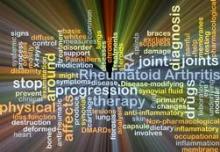SAN FRANCISCO – Filgotinib monotherapy yielded a 72% week 12 ACR 20 response for patients with rheumatoid arthritis and a 79% response when combined with methotrexate, according to two phase IIb dose-finding studies reported at the annual meeting of the American College of Rheumatology.
The Janus 1 kinase (JAK1) inhibitor caused dose-dependent increases in hemoglobin levels in both trials, and a few patients also had “substantial increases in creatinine, with some indication of a dose response,” said Dr. Arthur Kavanaugh, professor of clinical medicine and director of the Center for Innovative Therapy at the University of California, San Diego. But the overall safety profile for filgotinib was “attractive. We can see that this is an effective therapy,” he added.
Filgotinib, the first selective JAK1 inhibitor in development for rheumatoid arthritis, entered double-blind phase IIb trials in 2013. The DARWIN 1 trial compared filgotinib and a stable methotrexate dose with methotrexate and placebo in 594 patients with rheumatoid arthritis. The DARWIN 2 study compared filgotinib monotherapy with placebo in 283 patients who had not responded adequately to methotrexate. Patients in both trials were usually in their mid-fifties, had been diagnosed 7-10 years earlier, and had baseline 28-joint Disease Activity Score using C-reactive protein (DAS28-CRP) scores ranging from 6.0 to 6.2. The primary endpoint in both studies was the proportion of patients who achieved an ACR 20 response by week 12, said Dr. Rene R. Westhovens of KU Leuven (Belgium). He reported the results of DARWIN 1.
The combination regimen statistically outperformed methotrexate plus placebo at filgotinib doses of 100 mg once per day (week 12 ACR 20, 64% vs. 44%; P =.044), 200 mg once per day (69%; P less than .01), and 100 mg twice per day (79%; P less than .0001), Dr. Westhovens said. Filgotinib monotherapy also significantly outperformed placebo in terms of week 12 ACR 20, at all three doses tested – 50 mg once a day (67% vs. 29% for placebo), 100 mg once a day (66%), and 200 mg once a day (72%; all P less than .0001), according to Dr. Kavanaugh. “You might take away that perhaps the higher dose group got there faster. That should be the focus of future studies,” he said.
All three doses of filgotinib, given alone, also significantly outperformed placebo on several other endpoints, including ACR 50, ACR-N, DAS28-CRP, the Clinical Disease Activity Index, and the Simple Disease Activity Index, Dr. Kavanaugh added. By week 12, 24%-45% of patients who received filgotinib achieved low disease activity (DAS28-CRP of 3.2 or less), compared with 14% of the placebo group. Furthermore, after just 1 week of 100 mg or 200 mg of filgotinib per day, patients significantly improved on the ACR-N and the DAS28-CRP, compared with the placebo group.
Rates of serious adverse events were similar for the filgotinib and comparison groups in both trials, Dr. Kavanaugh and Dr. Westhovens reported. Notably, filgotinib was not associated with declines in natural killer cells or other forms of lymphopenia. Neutrophil counts declined slightly, compared with placebo, through 24 weeks, but did not seem to increase the risk of serious infections, although there was one case of cutaneous herpes zoster, Dr. Kavanaugh said. Likewise, rises in creatinine were usually mild and clinically insignificant, he added. “The reason for the rise in creatinine is unclear. It might be mechanistic, but whether we will see differences among the different [JAK] compounds remains to be elucidated,” he said.
Both DARWIN 1 and DARWIN 2 also reported dose-dependent rises in hemoglobin levels. Patients tended to have “small” increases in blood lipid levels, but the effects on HDL cholesterol were greater than for LDL cholesterol, Dr. Westhovens said.
For DARWIN 1, Dr. Westhovens reported financial support from Galapagos, the maker of filgotinib, and from Roche, Bristol-Myers Squibb, and Janssen. His senior author and three coauthors also reported financial relationships with Galapagos, and the other five coauthors had no disclosures. For DARWIN 2, Dr. Kavanaugh, his senior author, and three coauthors reported financial support from Galapagos, and five coauthors had no disclosures.


